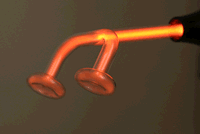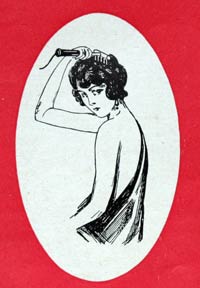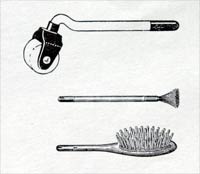

|
Welcome How They Work
This is not going to be an in depth article but simply a need to know explanation. If you do want a few equations, discussions on capacitors, coil building, circuit diagrams and wave form patterns then try some of the sites in our "links" section above There are normally two parts to a violet wand - a control unit and the violet wand handle.
The control unit at its most basic consists of a set of contact breakers, a coil and a capacitor. When turned on, you hear a buzzing sound - a noise made because the contact breakers are snapping open and shut around 55 times a second. It is when the contact breakers are open that the electrical circuit is cut off, and the energy stored in the coil oscillates between the coil and the capacitor at a much higher frequency Imagine plucking a guitar string 55 times a second. The buzzing sound you hear is you plucking the string at this low frequency and the note generated is the high frequency oscillating current. In the wand handle are two coils. The first, a primary is made of thick copper wire and consists of ten or so turns around the high voltage coil underneath. The hv coil consists of 12 -15 layers of fine copper wire wound to a width of 3/4 inch - the rest is insulation. This hv coil is like a transformer stepping up the voltage to between 30,000 and 50,000 volts and this flows out directly to a glass or metal attachment and applied to the subject. Thankfully the old established laws of energy conservation mean that current is significantly reduced as total energy remains the same (less losses such as heat) The return end of the hv coil connects back to the mains to complete the electrical circuit - if it did not, it would not work. Interestingly it does so in one of several ways -
Whichever system is utilized - and there are bound to be others - it is important that it is checked out by an expert before any metal attachments are used - just in case. If the isolator is an old wax paper capacitor (it has been known) then it should really be replaced my a modern one or a gap made at the business end The effect of this high frequency high voltage current to to jump small gaps and to travel along the surface of a conductor rather than straight through it. This is useful because it means you cannot fry your innards or stop your heart from beating and makes the whole idea of using one of these devices - less scary. The muscles also tend not react to this high frequency oscillating current. However, it is not advisable to use near say pacemakers or metal plates holding bones together as we do not know what the effects would be. Neither are we looking for volunteers to test this out Laptops, digital cameras, CD's, DVD's, etc - have also not been tested
PS: Finally, we cannot accept any liability for any errors or omissions on this web site or for any of our links to other sites. In a nutshell - if you zap yourself and your leg drops off - its your fault! |









|
| |
© 2002 - 2026 nickandmorphia.com